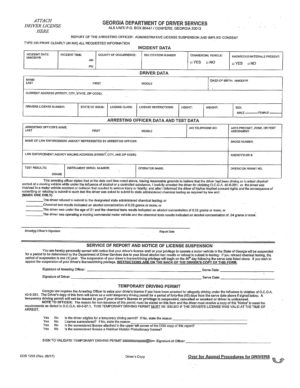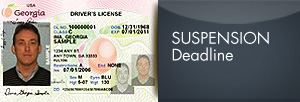Experienced Cobb County DUI Lawyers at Chestney & Sullivan
If you are arrested for Driving Under the Influence (DUI) in Cobb County, our experienced Cobb County DUI lawyers at Chestney & Sullivan are available to discuss your case anytime – including after-hours and weekends! We offer a free in-office consultation on how we can effectively defend your Cobb DUI charges.

Our Cobb County DUI lawyers understand what you are going through. Our experienced Cobb County DUI lawyers at Chestney & Sullivan are available to discuss your case anytime – including after-hours and weekends! Being arrested for a Driving Under the Influence charge in Cobb County is a stressful experience, especially when you are taken to the Cobb County Adult Detention Center. Call our experienced Cobb County DUI lawyers today to discuss your Driving Under the Influence charges in Cobb County State Court or anywhere in Cobb County. W offer a free consultation and we will review with you how our experienced DUI lawyers successfully defend DUI charges for alcohol or DUI drugs in Cobb County. Chestney & Sullivan can be reached 24/7 at 404.816.8777.
Our experienced Cobb County DUI lawyers are prepared to vigorously defend your Cobb Driving Under the Influence case whether you have a DUI in Acworth, Austell, Kennesaw, Marietta, Powder Springs, Smyrna, Cobb County State Court, or anywhere else in Cobb County. The roads surrounding The Battery are a known hot spot for Cobb County police patrolling for impaired drivers. With the Atlanta Braves winning the World Series in 2021 and starting another season, there are increased patrols for impaired drivers around The Battery. The Battery is now a popular dining and bar destination year-round.
The Governor’s Office of Highway Safety recently awarded the Cobb County Police Department a HEAT grant to fund the Cobb County Police Department’s HEAT unit, which is comprised of three Cobb County Police Officers. This unit concentrates on DUI detection in Cobb County. This stepped-up DUI enforcement works with the Governor’s Office of Highway Safety (GOHS), the agency that coordinates DUI enforcement programs. H.E.A.T. grant recipients, like the Cobb County Police Department and Georgia State Patrol Nighthawks, must participate in these campaigns as part of special conditions in their grant. Cobb Police Department is also using federal money through the American Rescue Plan Act to hire more public safety officers
Our Cobb County DUI lawyers understand what you are going through:
Being arrested for a Cobb Driving Under the Influence charge can be a stressful experience. You may have many questions about your case including what penalties you may face if you are arrested for Driving Under the Influence in Cobb County? What is the court process in Cobb County? What possible defenses are there in my DUI case? You may also have concerns about your ability to drive and a possible license suspension. People come to us because we provide the absolute most vigorous defense available to those facing DUI charges in Cobb. And in the majority of cases, our Cobb County DUI lawyers can protect their freedom, ability to drive, and criminal record. You may not feel at this time that you have a strong opportunity to avoid a conviction for the charges you face. But the law provides protections to you that are very important that may lead to a successful defense in an otherwise seemingly indefensible case!
We are available to answer your questions and we understand the anxiety you may be experiencing. Our Cobb DUI lawyers can put your mind more at ease as we explain the court and investigation process as well as how we successfully defend DUI charges in Cobb County. Our DUI lawyers are available anytime to discuss your case – including on weekends! Call us at 404.816.8777 today.
When your Cobb Driving Under the Influence case begins in any one of the municipal courts, if you demand a jury trial, the municipal court loses jurisdiction over your Cobb DUI case and it is transferred to the Cobb County state or superior court system for prosecution. Sometimes preserving your right to a jury trial is the best option if the prosecution in municipal court refuses to negotiate an acceptable resolution in your case. Some Cobb municipal courts simply will not allow a Driving Under the Influence case to be tried in their jurisdiction, leaving the only option to contest your Cobb DUI case in the Cobb County State or Superior Court system.

The Cobb County Solicitor’s Office will be responsible for the prosecution of your Cobb DUI when you request a jury trial in a municipal court and your case will be transferred over to state court as your case will be prosecuted by their office if it involves misdemeanor charges. The solicitor’s office is also responsible for prosecuting your case if it is sent directly to the Cobb County State Court, bypassing any of the municipal courts in Cobb County. The current elected Cobb County Solicitor is Maki Metzger, who took over from Barry Morgan. Barry Morgan was arrested for DUI on March 11, 2021, in Cherokee County. He entered a guilty plea in Cherokee County State Court on June 4, 2021. Mr. Morgan has decided not to run for re-election for Solicitor General of Cobb County and retired at the end of December, 2022. Barry Morgan was recently appointed to become a part time magistrate judge in Cobb Magistrate Court. The former Chief Assistant Solicitor Chris Lanning lost his bid in the Democratic primary for Solicitor General to Maki Metzger. Ms. Metzger won the general election against Courtney Brubaker for the Solicitor General position and took office effective January 1, 2023.
In general, two prosecutors are assigned to each courtroom in Cobb County State Court. There are many times when a jury trial is the best possible option to avoid a DUI conviction in your Cobb DUI case. Because the Cobb County municipal courts do not conduct jury trials, your case would need to be transferred to the Cobb County State Court for trial. Cobb State Court currently has twelve state court judges and two senior state court judges. The twelve state court judges are Chief Judge Carl Bowers, Judge Eric Brewton, Judge Bridgette Campbell, Judge Jason Fincher, Judge Maria Golick, Judge Marsha Lake, Judge Jane Manning, Judge John Morgan, Judge Ashley Palmer, Judge Allison Salter, Judge Diana Simmons, and Judge Jaret usher. Vacancies were created on the Cobb State Court bench when Judge David Darden retired and Judge Henry Thompson was appointed to the superior court. Jaret Usher took Judge Thompson’s place in state court on January 1, 2022. Judge Eric Brewton was appointed to Judge Darden’s seat, and Judge Ashley Palmer was appointed to Judge Brewton’s old seat. Your case will be assigned to one of the twelve judges once your case is filed with the Cobb County Clerk of Court. Our Cobb DUI lawyers try Driving Under the Influence cases in Cobb County regularly. Because we frequently contest DUI cases in Cobb County State Court, we are familiar with the judges and the prosecutors who will be handling your case.
Even though your case may have been sent to Cobb County State Court from a municipal court or Cobb Recorder’s Court, there are also times the facts of a particular Cobb DUI may be best suited for a “bench trial” (a trial where the judge decides the case instead of a jury) in state court. This determination is usually made after an investigation into your Cobb DUI is complete, where our Cobb county DUI Lawyers look to the judge’s assignment, the facts of the case, and the legal issues involved.

The Cobb County Police Headquarters moved its headquarters to 545 S. Fairground Street, Marietta, GA 30060. The Cobb Police has a specialized DUI Task Force and they by far make the most DUI arrests in Cobb County. The Cobb DUI Task Force officers, like all Cobb County police officers, have received a minimum of 16 hours of DUI training in the police academy. Most Cobb DUI Task Force officers trained have received an additional 24-hour standardized field sobriety course (SFST) endorsed by the National Highway Traffic Safety Administration (NHTSA). The Cobb County Police Department received a grant in September 2019 for a specialized traffic enforcement unit called H.E.A.T. that will have an additional concentration on DUI detection and enforcement in Cobb County. Some Cobb DUI Task Force officers have received additional DUI training such as ARIDE (Advanced Roadside Impaired Driving Enforcement), or DRE (Drug Recognition Expert). The Cobb County Police DUI task Force Officers are also known for seeking search warrants for blood fi a driver refuses to voluntarily submit to a chemical test when arrested for a DUI. All of the Cobb County DUI Task Force officers are certified by the Georgia Bureau of Investigation to operate Georgia’s newest breath testing instrument, the Intoxilyzer 9000. Our Cobb County DUI lawyers also see DUI arrests in Cobb County made by the Georgia State Patrol Nighthawks (DUI task force), and if there is a major accident, Georgia State Patrol will also bring in their “SCRT” team (Specialized Collision and Reconstruction Team) to conduct an investigation.
Our Cobb DUI defense attorneys know how to challenge a Cobb DUI. We are all trained in Standardized Field Sobriety Evaluations. Mr. Sullivan was certified in Standardized Field Sobriety evaluations by “SFST” instructors with the Conyers Police Department and Rockdale County Sheriff’s Office. One of the benefits of investigating and contesting a Cobb Driving Under the Influence charge is that most of the Cobb DUI Task Force vehicles are equipped with video and audio. Their video equipment has some features similar to a DVR or “TVO” that many people have at home for their TVs. Their equipment is continuously recording, but will not preserve anything until the officer manually activates the recording or activates his emergency equipment (lights). Then the video will preserve somewhere between 30 and 60 seconds of time before activation and typically the Cobb DUI officers will run their video until it is turned off when they reach the jail or their final destination. Many of the Cobb Police officers have body cameras that will be provided to us by the Solicitor’s Office. Videos can also be obtained or viewed through the court process.
How our skilled Cobb County DUI lawyers build a successful defense in your Cobb DUI case:
To build a strong DUI defense in Georgia, our Cobb County DUI lawyers start by meeting with you about your Cobb DUI case and learning as much as possible from you about what happened. Using this core information, we can look for more evidence to help our defense by using specialized resources as needed to determine if all testing and other details of your arrest were accurate and legal. We gather information, videos, 911 calls, possible surveillance videos, police reports, documents of road/scene conditions, and more. There are also times when we use the services of toxicologists, accident reconstructionists, private investigators, breath test/field sobriety experts, medical professionals, and video illustrators, to name a few, to help build a solid defense in your Driving Under the Influence case in Cobb County. Our Cobb DUI lawyers then analyze your case starting with whether the initial stop or reason why the police were involved was legal. We also look for suppression issues with the admissibility of field sobriety tests or state chemical tests (breath, blood, or urine tests). We also develop strategies on how to best conduct the license suspension hearings, preliminary/committal hearings, motion hearings, and trials. This approach is an effective way to ensure we are prepared to defend your Cobb DUI.
Can I just enter a guilty plea myself to Driving Under the Influence and avoid hiring an experienced Cobb County DUI lawyer?

There is a saying that “a person who represents himself has a fool for a client.” Driving Under the Influence cases in Cobb County are one of the most serious cases that are prosecuted in Cobb County State Court. Even if you think you are guilty and may not want to fight your Cobb DUI case all the way, there are matters that a skilled Cobb County DUI lawyer is better able to handle than someone representing him or herself. Here are some reasons why you may consider hiring Chestney & Sullivan rather than representing yourself:
- You can put your driving privileges in jeopardy if you simply go to court and enter a guilty plea by yourself. If you have been arrested by a Cobb DUI officer, you will be taken to the Cobb County Adult Detention Center, and you likely were served a notice of an administrative license suspension action. If you enter a guilty plea without properly addressing the license suspension action, you will not be able to get a limited permit (if you are eligible to get one at all) until and unless the administrative action is conducted properly.
- If your license is suspended for refusing the Cobb DUI officer’s chemical test from losing a license suspension hearing or failing to address a license suspension action within 30 days from the date of your arrest, your Georgia driver’s license or driving privileges will be suspended for a year with NO PERMIT. Properly coordinating and handling the Cobb DUI criminal charges and the license suspension action can improve your chances of being able to drive.
- Other charges, in addition to your Cobb DUI charge, may be more serious and carry more punishment than the Driving Under the Influence charge itself.
- Sometimes the prosecutor gives a bad plea offer. Even if you decide not to contest your case, an experienced Cobb DUI attorney who is familiar with the municipal courts in Cobb County, as well as Cobb County State Court or Superior Court, can assess a plea offer to determine if it is worth taking or whether it is best to take your case to trial.
- If you decide to represent yourself at trial, the Georgia Rules of Evidence still apply to you. Lawyers go to law school for years to learn these rules and you will be at the mercy of a skilled prosecutor and judge if you are not careful.
Cobb County Police Officers are using search warrants (for your blood) to use in the prosecution of your Driving Under the Influence case, a skilled Cobb County DUI lawyer can attack their use of search warrants:
On July 1, 2006, a law took effect in Georgia that expands the available use of search warrants in Driving Under the Influence cases (OCGA 40-5-67.1(d.1)). This law was passed after the Georgia Supreme Court in State v. Collier, 279 Ga. 316 (2005), ruled that law enforcement officers could not use coercion techniques to obtain a blood sample by threatening to get a search warrant and use a catheter to obtain it. The statute at the time of the Collier case prohibited search warrants for bodily substances if a person refuses to submit to a chemical test pursuant to the Georgia Implied Consent Notice. The 2006 legislation was an attempt to expand the use of search warrants in Driving Under the Influence arrests. Our Cobb County DUI lawyers believe the final version of the legislation falls short of allowing search warrants for blood, breath, or urine samples when a suspect refuses to submit a sample after being read the Georgia Implied Consent Notice. The language of “no test shall be given” if a driver refuses the state chemical test is still in the current version of the statute. Our firm is also making a constitutional challenge to how the 2006 statute was passed by the Georgia Assembly (Georgia legislature). If the Cobb County Police Officer obtained a chemical sample from you after getting a search warrant, call us today and we can explain in more detail how we are attacking the admissibility of chemical tests obtained by search warrants in Driving Under the Influence cases. Although you may have ultimately given a chemical sample to the Cobb County Police pursuant to a search warrant, your officer may still attempt to suspend your Georgia driver’s license or privilege to drive here in this state administratively if you refused initially to submit to a chemical test when the implied consent notice was read. See below for steps that may need to be taken to protect your driving privileges. Currently, the Cobb Police Department is taking the position that if a suspected DUI driver refuses a blood test pursuant to a search warrant, the police will not force a blood draw, but will bring an additional charge of Obstruction of a Law Enforcement Officer, and serve you with a notice of a license suspension action.
Administrative License Suspension
IMPORTANT INFORMATION CONCERNING YOUR DRIVER’S LICENSE WHILE YOUR COBB DRIVING UNDER THE INFLUENCE CRIMINAL CHARGES ARE PENDING IN COURT

Besides your Cobb DUI criminal case pending in Cobb County, you are likely facing an administrative license suspension. There is only a limited time to request a separate hearing conducted y the Office of State Administrative Hearings to preserve your driving privileges. Whether you refused the State’s chemical test, or the breath test results indicated an alcohol concentration above the legal limit, Georgia law requires your Cobb DUI officer to serve you notice of an administrative license suspension. If you have been arrested by a Cobb DUI Task Force Officer, you can be sure that they initiated a license suspension action against you. The notice that is used is called a DDS-1205 form. This form is either yellow or white and the officer may have had you sign it. Sometimes this paperwork gets lost (you may have received it, but may have been misplaced, or it may have been lost at the jail).
Our Cobb County DUI Lawyers strongly suggest that you set up an online account with the Georgia Department of Driver Services to monitor the status of your driver’s license: https://dds.georgia.gov/online-services

Regardless of whether you have actually received a DDS-1205 form in your Cobb DUI case, it is important for you to understand that you only have 30 days to request a hearing to preserve your driving privileges or waive your hearing through the Georgia Department of Driver Services by opting for an ignition interlock device permit.
Three tracks you can take:
(Beware of making a choice without the advice of an experienced Cobb DUI lawyer)
-
Do nothing within 30 days of the date of your Cobb DUI arrest:
In most cases, we do not recommend that you do nothing within 30 days of the date of your Cobb DUI arrest. If you do nothing and your Cobb DUI officer initiated an administrative license suspension action, then on the 46th day after the date of you being arrested for Driving Under the Influence in Cobb, your driving privileges will automatically be suspended by Georgia Department of Driver Services for one year with no permit to drive. Even if you did not receive the DDS-1205 form as a result of your Cobb Driving Under the Influence arrest, we still recommend that you take some sort of action instead of doing nothing. However, there are limited circumstances where we recommend our clients do nothing regarding a license suspension action, but those circumstances are very rare.
-
Request for an administrative hearing:
Making a request for an administrative hearing is the traditional track that has been the law for many years now, except now there are thirty days instead of ten business days to take action. This track is where a request for an administrative hearing is submitted to the Georgia Department of Driver Services challenging the Cobb DUI officer’s decision to administratively suspend your driver’s license for testing above Georgia’s “per se” legal limit for alcohol concentration, or for refusing your Cobb DUI officer’s request for a state-administered chemical test of your breath, blood, urine, or other bodily substances. There is a $150 filing fee made payable to the Dept. of Driver Services in order for DDS to process the hearing request.
-
Properly waive your right to an administrative hearing and have an ignition interlock installed:
The track to properly waive your right to an administrative hearing and have an ignition interlock installed came into effect on July 1, 2017. This allows the first DUI arrest in five years for drivers to be able to drive in the state of Georgia and fight their Cobb DUI criminal case without losing the privilege to drive. It comes with a cost of course. It involves you waiving your right to an administrative hearing through the Georgia Department of Driver Services and you will need to have installed an ignition interlock device on your vehicle by an approved Ignition Interlock Device Provider for a minimum of 120 days if you tested over the “per se” legal limit, or one solid year of having the ignition interlock device installed in your vehicle (and driving under the confines of an ignition interlock permit) if you refused the Cobb DUI officer’s request for a state-administered chemical test. If you choose this track, we highly advise that you install the ignition interlock first, then go to DDS within 30 days from the date of arrest to obtain the permit. There are obvious concerns and pitfalls in choosing this track. For many people, the stigma of having the ignition interlock device installed in their vehicle is just not worth it. The ignition interlock device is also expensive: it requires an installation fee as well as a monthly monitoring fee. And if you remove it while under your ignition interlock permit, tamper with it, or it tests positive, your permit to drive may be revoked for six months – meaning no driving at all. In addition to waiving your right to an administrative hearing and having an ignition interlock device installed on your vehicle, you must also meet the following conditions:
-
- An application for the permit must be made with DDS within 30 days of the person being served notice of the administrative license suspension (ALS) by the Cobb DUI arresting officer through the DDS-1205 form (usually 30 days from the date of arrest), or—in the event of a DDS-1205S form—within 30 days of receiving such notice of the ALS from DDS (from a blood test result that was not procured by a search warrant);
- The ALS cannot stem from a motor vehicle accident involving fatalities or serious injuries;
- The person must be licensed in Georgia and not have any other suspensions, cancellations, or revocations against his or her Georgia driver’s license;
- If the person holds a Georgia commercial driver’s license (CDL), he or she must downgrade to a non-commercial Georgia driver’s license in order to obtain and maintain the permit;
- A driver cannot have any prior convictions for Driving Under the Influence in the 5-year period preceding the application for the permit. If there is a DUI arrest with a DUI conviction within 5 years of the current Cobb Driving Under the Influence arrest, the person can still opt for track 2 – requesting an administrative hearing, or track 1 – do nothing at all;
- The person must surrender his or her Georgia driver’s license, either to the Cobb DUI arresting officer at the time of arrest or to DDS prior to issuance of the permit; and,
- There is a $25.00 permit fee to the Georgia Department of Driver Services.
The period a person must successfully maintain the ignition interlock device on their vehicle will be based on whether he or she consents to or refuses the state-administered chemical test requested by the Cobb DUI arresting officer. A person who consents to the state-administered chemical test and opts for the new permit will be required to successfully maintain the ignition interlock device on their vehicle for a period of 4 months. If he or she is subsequently acquitted of the underlying Cobb DUI charge, or the underlying DUI charge is dismissed or reduced, the ignition interlock device may be removed at no cost and the driver’s license may be replaced. A person who refuses the state-administered chemical test and opts for the new permit will be required to successfully maintain the ignition interlock device on their vehicle for a period of 12 months, regardless of the outcome of the Driving Under the Influence charge in Cobb.
Successful maintenance of the ignition interlock device must be evidenced by the permit holder to DDS through the production of satisfactory monthly monitoring reports prior to DDS removing the ignition interlock restriction from the permit. A permit may be renewed for a fee of $5.00 if additional time is needed for the permit holder to comply with the terms of the ignition interlock device, but it may only be renewed one time once the permit holder becomes eligible to reinstate his or her driver’s license. Following the designated term of successful compliance, the ignition interlock device restriction may be removed from the limited driving permit in person at a DDS customer service center for a fee of $100.00 (or $90.00 if removal of the restriction is requested by mail or other approved alternate means). The removal fee is in addition to any reinstatement fee that may be required.
As the title of the ignition interlock device limited permit suggests, there are limitations on where you can drive while on the IID permit:
- Going to his or her place of employment or performing the normal duties of his or her occupation;
- Receiving scheduled medical care or obtaining prescription drugs;
- Attending a college or school at which he or she is regularly enrolled as a student;
- Going to regularly scheduled sessions or meetings of treatment support organizations for persons who have an addiction or abuse problems related to alcohol or other drugs, which organizations are recognized by the commissioner;
- Attending under court order any driver education or improvement school or alcohol or drug program or course approved by the court which entered the judgment of conviction resulting in suspension of his driver’s license or by the commissioner;
- Appearing in court, reporting to community supervision, juvenile probation, or Article 6 of Chapter 8 of Title 42 probation office, reporting to a community supervision officer, county or Department of Juvenile Justice probation officer, or probation officer serving pursuant to Article 6 of Chapter 8 of Title 42, or performing community service;
- transporting an immediate family member who does not hold a valid driver’s license for work, to obtain medical care or prescriptions, or to school;
- Attending any program, event, treatment, or activity ordered by a judge presiding in an accountability court, as such term is defined in Code Section 15-1-18; or
- Going for monthly monitoring visits with the permit holder’s ignition interlock device service provider.
Contact our experienced Cobb County DUI lawyers today to discuss your Cobb Driving Under the Influence case with our dedicated Cobb DUI lawyers at 404.816.8777. Our Cobb DUI defense attorneys are experienced in handling license suspension actions. We can review your case and prepare a strategy for defending your Cobb DUI charges and your license suspension action.
Frequently Asked Questions About Cobb County DUI Cases
So I made a proper request for a license suspension hearing in my Cobb DUI case, what happens next?
The license suspension action is a civil action separate from your Cobb DUI criminal case and only deals with your license or privilege to drive in this state. As a matter of fact, the license suspension action is litigated by a completely separate court from your Cobb DUI criminal case. Once the Georgia Department of Driver Services processes your request for a hearing, your case is then sent to the Georgia Office of State Administrative Hearings (OSAH) where a hearing will be scheduled in front of a judge from that agency. Typically a hearing date is set roughly 60 days from the date of your Cobb Driving Under the Influence arrest. Once a hearing is requested, the Department of Driver Services will extend your driving privileges until there is an order entered from an OSAH judge.
The scope of the hearing is very limited:
At a hearing, the OSAH judge has a very limited role in deciding your case. The judge is bound by law to only look at certain statutory factors to determine whether or not those statutory factors were met based on the evidence presented at the hearing. That is it. The judge does not look at your criminal or driver’s history. The judge is not concerned about your job, transportation issues with your children’s school or daycare, or any other hardship you may have if your license is suspended. The judge’s only role in a license suspension hearing is to determine if the following factors were met:
- Whether your Cobb DUI law enforcement officer had reasonable grounds to believe the person was driving or in actual physical control of a moving motor vehicle while under the influence of alcohol or a controlled substance and was lawfully placed under arrest for violating Code Section 40-6-391 (the DUI statute); or
- Was the person involved in a motor vehicle accident or collision resulting in serious injury or fatality; and
- Whether at the time of the request for the test or tests the Cobb DUI officer informed the person of the person’s Implied Consent rights and the consequences of submitting or refusing to submit to such test; and
- Did the person refuse the test; or whether a test or tests were administered and the results indicated an alcohol concentration of 0.08 grams or more or, for a person under the age of 21, an alcohol concentration of 0.02 grams or more or, for a person operating or having actual physical control of a commercial motor vehicle, an alcohol concentration of 0.04 grams or more; and
- Whether the test or tests were properly administered by an individual possessing a valid permit issued by the Division of Forensic Sciences of the Georgia Bureau of Investigation on an instrument approved by the Division of Forensic Sciences or a test conducted by the Division of Forensic Sciences, including whether the machine at the time of the test was operated with all of its electronic and operating components prescribed by its manufacturer properly attached and in good working order, which shall be required. A copy of the operator’s permit showing that the operator has been trained on the particular type of instrument used and one of the original copies of the test results or, where the test is performed by the Division of Forensic Sciences, a copy of the crime lab report shall satisfy the requirements of this subparagraph.
How is the OSAH administrative hearing conducted?
The judge will enforce the Georgia Rules of Evidence, and the Administrative Rules of Procedure – similar to other court proceedings. Because the burden is on your Cobb DUI officer to establish that the statutory factors were met, the Cobb DUI officer testifies first. Some jurisdictions allow DUI officers to have help from the prosecutor’s office, or if the officer is a Georgia State Trooper, an attorney paid by the State of Georgia assists the officer on direct examination. The Cobb DUI officer is then subject to cross-examination. There are times when we may decide to place our clients or other witnesses on the stand for direct examination. Our witnesses would then be subject to cross-examination from the other side. Once the testimony and presentation of the evidence are finished, each side can make a closing argument. The judge will then make a decision typically within 5 business days and will transmit that decision to the parties and the Georgia Department of Driver Services. The decision is also posted on the Office of State Administrative Hearings website. If there is an error in how the judge ruled, there is an appellate process available to review the court’s decision.
What happens if I win the administrative hearing?
If the judge finds that one or more of the applicable statutory factors above are not met in your Cobb DUI case, then the judge will issue an order reversing the suspension action, transmit it to the Georgia Department of Driver Services, and then Georgia DDS will delete the license suspension action off your driver’s history (no administrative license suspension) and your driving privileges are reinstated pending the outcome of the criminal case. This does not mean that the Cobb DUI criminal charges are being dismissed, but an OSAH hearing can be a great tool for a Cobb County DUI lawyer to gain an advantage in your Cobb DUI criminal case.
What happens if I lose my license suspension hearing?
If the judge finds that all of the applicable statutory factors were met by a preponderance of the evidence (a lower standard of proof than beyond a reasonable doubt) at the license suspension hearing, then the judge will issue an order affirming the license suspension action and will transmit the order to the Georgia Department of Driver Services, who will then impose the license suspension. Again, because the burden on the Cobb DUI officer is so low to meet in these license suspension hearings, there is a good possibility that your license may be suspended, but we still may be able to gain an advantage in the Cobb DUI criminal case based on testimony from the license suspension hearing. If the judge committed an error in a ruling, the decision can be appealed by your Cobb County DUI lawyer. Also, if your Cobb DUI charge is reduced, or dismissed, or you are found not guilty, the suspension is lifted and deleted from your driver’s history as a matter of law.
Can I handle the license suspension hearing myself in my Cobb DUI case?
Because an administrative license suspension action (and license suspension hearing) from a Georgia Driving Under the Influence arrest is a very complex subject that even many lawyers don’t understand, our Cobb County DUI lawyers strongly encourage you to contact us right away to discuss your Cobb DUI case. There are simply too many variables that can impact your driving privileges to be discussed here without knowing the specific facts of your case and your prior criminal history. Remember, you only have 30 days to request a license suspension hearing through the Georgia Department of Driver Services. Call our Cobb County DUI lawyers today and we are more than happy to discuss your case and the license suspension action process.
What if I am convicted of a DUI in Cobb County? What are the penalties I am facing?
If you have been arrested for a DUI in Cobb County, it is important to know that there are mandatory Georgia DUI penalties for DUI convictions under the Georgia Code, which are set forth below. The mandatory minimum penalties represent the absolute minimum requirements under Georgia law. Municipal courts in Cobb County or Cobb State Court judges can sentence you anywhere from the minimum penalty under the Georgia Statute all the way up to the maximum penalty allowed by law. For any general misdemeanor, including your Cobb DUI, the maximum penalty could be up to 12 months in jail for each offense charged. Judges also have the discretion to add special probation conditions not listed below. For most DUI convictions part or all of the sentence will be served on probation. Additional penalties outside what is listed below may be imposed for DUI cases with other criminal charges. In our experience, any sentence imposed typically exceeds the mandatory minimum penalty. If you are a multiple DUI offender, Cobb County does offer a specialized DUI Court program that may significantly lessen a jail sentence.
Contact Chestney & Sullivan Law Firm today at 404.816.8777. A Cobb DUI trial lawyer is available 24 hours a day, 7 days a week to discuss your case.
Mandatory Georgia DUI penalties for DUI convictions under the Georgia Code
Below are statutory penalties for DUIs in Georgia. Depending on which Cobb State Court Judge your case is assigned to, and your criminal history, it is likely that a judge will not give the statutory minimum penalties and increase punishment. A Cobb County DUI lawyer will be in a better position to advise you on what a particular judge may do if you are convicted for a DUI.
PENALTIES FOR A FIRST DUI CONVICTION WITHIN TEN YEARS:
(measured from the dates of previous arrests for which DUI convictions were obtained to the date of the current arrest for which a DUI conviction is obtained)
- Jail time: 10 days in jail of which the judge can suspend, stay, or probate all but 24 hours for offenses with an alcohol concentration of .08 or more. There is no statutory minimum jail sentence where the State can’t prove an alcohol concentration of 0.08 or more. The maximum is 12 months in jail;
- Probation: 12 months of probation minus any jail time served (by law, this probationary time period cannot be shortened);
- Fine: $300-$1000 plus statutorily mandated surcharges, assessments, and probation supervision fees;
- Community Service:21 & over drivers: 40 hours – 250 hours;
- Under 21 drivers with an alcohol concentration of .08 or more: 40 hours – 250 hours;
- Under 21 with alcohol concentration under .08: 20 hours – 250 hours;
- DUI Alcohol or Drug Use Risk Reduction Program: Must be completed within 120 days of the sentence (List of approved schools at: https://dds.georgia.gov/certified-dui-schools-locations);
- Clinical evaluation for substance abuse: follow any recommended treatment (judge has the discretion to waive clinical evaluation): (List of approved evaluators at: https://dbhddapps.dbhdd.ga.gov/MOPAS/ProviderSearch/SearchDUIIPProvider.aspx);
- License suspension (see license suspension section below).
PENALTIES FOR A SECOND DUI CONVICTION WITHIN TEN YEARS:
(measured from the dates of previous arrests for which DUI convictions were obtained to the date of the current arrest for which a DUI conviction is obtained)
- Jail time: 90 days – 12 months in jail, of which the judge can probate all but 72 hours;
- Probation: 12 months of probation minus any jail time served (by law, this probationary time period cannot be shortened);
- Fine: $600 – $1000 plus statutorily mandated surcharges, assessments, and probation supervision fees;
- Community Service: 30 days (240 hours – 250 hours);
- DUI Alcohol or Drug Use Risk Reduction Program: Must be completed within 120 days of the sentence (https://dds.georgia.gov/certified-dui-schools-locations);
- Clinical evaluation for substance abuse: Required by statute and Georgia DBHDD regulations (judge has no discretion to waive). Must follow and complete any recommended treatment. (List of approved evaluators at: https://dbhddapps.dbhdd.ga.gov/MOPAS/ProviderSearch/SearchDUIIPProvider.aspx);
Additional requirements for drivers convicted for a second DUI offense within 5 years:
- Photo and Case Disposition Published: published as a legal notice in the county legal organ where the defendant resides or in the county legal organ where the conviction was obtained ($25 assessed);
- License Plates Confiscated: all license plates on vehicles registered to the offender are to be surrendered to the court (by court order) and a receipt issued. A license plate will only be reissued after a permit is issued or suspension is over (there is a possible hardship exception for other household members/co-owner of a vehicle);
- Ignition Interlock Device (see below);
- License suspension (see license suspension section below).
PENALTIES FOR A THIRD DUI CONVICTION WITHIN TEN YEARS:
(measured from the dates of previous arrests for which DUI convictions were obtained to the date of the current arrest for which a DUI conviction is obtained)
- Jail time: 120 days – 12 months in jail, of which the judge can probate all but 15 days;
- Probation: 12 months of probation minus any jail time served (by law, this probationary time period cannot be shortened);
- Fine: $1000 – $5000 plus statutorily mandated surcharges, assessments, and probation supervision fees;
- Community Service: 30 days (240 hours – 250 hours);
- DUI Alcohol or Drug Use Risk Reduction Program: Must be completed within 120 days of the sentence (List of approved schools at: https://dds.georgia.gov/certified-dui-schools-locations);
- Clinical evaluation for substance abuse: Required by statute and Georgia DBHDD regulations (judge has no discretion to waive). Must follow and complete any recommended treatment. (List of approved evaluators at: https://dbhddapps.dbhdd.ga.gov/MOPAS/ProviderSearch/SearchDUIIPProvider.aspx);
- License suspension (see license suspension section below);
Additional requirements for drivers convicted for a second or more DUIs within 5 years (measured from the dates of previous arrests for which DUI convictions were obtained to the date of the current arrest for which a DUI conviction is obtained):
- Photo and Case Disposition Published: published as a legal notice in the county legal organ where the defendant resides or in the county legal organ where the conviction was obtained if the defendant is a nonresident ($25 assessed);
- License Plates Confiscated: all license plates on vehicles registered to the offender are to be surrendered to the court (by court order) and a receipt issued. A license plate will only be reissued after a permit is issued or suspension is over (there is a possible hardship exception for other household members/co-owner of a vehicle);
- Ignition Interlock Device (see below);
- Declared a Habitual Violator (for third in five-year conviction measured from the dates of previous arrests for which convictions were obtained to the date of the current arrest for which a conviction is obtained).
PENALTIES FOR A FOURTH OR SUBSEQUENT DUI CONVICTION WITHIN TEN YEARS:
(measured from the dates of previous arrests for which DUI convictions were obtained to the date of the current arrest for which a DUI conviction is obtained)
-
- Felony if all four or more DUI arrests resulting in DUI convictions occur after July 1, 2008. Jail time: 1- 5 years in jail, of which the judge can probate all but 90 days;
- Probation: 5 years of probation minus any jail time served;
- Fine: $1000 – $5000 plus statutorily mandated surcharges, assessments, and probation supervision fees;
- Community Service: 60 days (480 – 500 hours)(can be suspended by the judge if incarceration is for 3 or more years);
- Misdemeanor (High and Aggravated) only if NOT all four or more DUI arrests resulting in DUI convictions occur after July 1, 2008. Jail time: 120 days – 12 months in jail, of which the judge can waive or suspend all but 15 days;
- Probation: 12 months of probation minus any jail time served (by law, this probationary time period cannot be shortened);
- Fine: $1000 – $5000 plus statutorily mandated surcharges, assessments, and probation supervision fees;
- Community Service: 30 days (240 hours – 250 hours);
- DUI Alcohol or Drug Use Risk Reduction Program: Must be completed within 120 days of the sentence (List of approved schools at: https://dds.georgia.gov/certified-dui-schools-locations);
- Clinical evaluation for substance abuse: Required by statute and Georgia DBHDD regulations (judge has no discretion to waive). Must follow and complete any recommended treatment. (List of approved evaluators at: https://dbhddapps.dbhdd.ga.gov/MOPAS/ProviderSearch/SearchDUIIPProvider.aspx);
- License suspension (see license suspension section below);
Additional requirements for drivers convicted for a second or more DUIs within 5 years:
- Photo and Case Disposition Published: published as a legal notice in the county legal organ where the defendant resides or in the county legal organ where the conviction was obtained if the defendant is a nonresident ($25 assessed);
- License Plates Confiscated: all license plates on vehicles registered to the offender are to be surrendered to the court (by court order) and a receipt issued. A license plate will only be reissued after a permit is issued or suspension is over (there is a possible hardship exception for other household members/co-owner of a vehicle);
- Ignition Interlock Device installed (see below);
- Declared a Habitual Violator (for a third in five-year conviction measured from the dates of previous arrests for which DUI convictions were obtained to the date of the current arrest for which a DUI conviction is obtained);
- Possible Seizure and Forfeiture of Motor Vehicle: If already declared a Habitual Violator for 3 prior DUI convictions and arrested and convicted for a new DUI.
License Suspension For DUI ALCOHOL Convictions
NOTE: Georgia Department of Driver Services (DDS) has new documentation requirements to get an I.D., license, or permit. Also, DDS is now allowing payment of reinstatement fees online. Please visit https://dds.georgia.gov/secure-id-faqs to find out what documents you will need to bring with you to DDS.
Listed below are license suspension penalties for Georgia drivers excluding CDL or other classes of Georgia licenses for DUI alcohol offenses. Additional or harsher penalties may apply to CDL or other classes of Georgia licenses that are not listed below. Additional or harsher suspensions may be imposed as a result of other criminal charges associated with the DUI case. Different suspension penalties may also be imposed as a result of a DUI Drug conviction pursuant to OCGA ’40-5-63, ‘ 40-5-75; §40-5-76 (permit for Drug Court participants); as well as from any judgment resulting from a Georgia administrative license suspension action. Out-of-state drivers are NOT ELIGIBLE for a limited permit in Georgia unless they obtain a valid Georgia license prior to sentencing. Out-of-state licensees may also face penalties not only from Georgia but from the licensee’s home state as a result of a Georgia conviction for DUI or an administrative license suspension action – even if the out-of-state driver obtains a Georgia driver’s license prior to sentencing.
License Suspension (first DUI conviction within 5 years):
- 21 & over drivers: 12 months suspension, possible immediate limited permit for Georgia licensees, and possible early license reinstatement after 120 days upon completion of DUI Alcohol or Drug Use Risk Reduction Program and payment of reinstatement fee ($200 by mail/internet, $210 in person);
- Under 21 drivers with an alcohol concentration of .08 or more: 12 months suspension with no limited permit, completion of DUI Alcohol or Drug Use Risk Reduction Program, and payment of restoration fee ($200 by mail/internet, $210 in person);
- Under 21 drivers with alcohol concentration under .08 or “refusal”: 6 months suspension with no limited permit, completion of DUI Alcohol or Drug Use Risk Reduction Program, and payment of restoration fee ($200 by mail/internet, $210 in person);
- Additional penalties for under 16 drivers: Not eligible for a license until age 17. Driver must submit proof of completion of a DUI Alcohol or Drug Use Risk Reduction Program or an assessment and intervention program approved by the juvenile court and payment of a reinstatement fee ($200 by mail/internet, $210 in person) to the Department of Driver Services;
- 21 & over Drivers: second DUI conviction in 10 years (first in 5) suspension: 12 months suspension, possible immediate limited permit for Georgia licensees and possible early license reinstatement after 120 days upon completion of DUI Alcohol or Drug Use Risk Reduction Program, required clinical evaluation for substance abuse and completion of any recommended treatment program, and payment of restoration fee ($200 by mail/internet, $210 in person);
- Restrictions of Limited Permit: (for Georgia licensees who qualify) Going to his or her place of employment;
- Receiving scheduled medical care or obtaining prescription drugs;
- Attending a college or school at which he or she is regularly enrolled as a student;
- Attending regularly scheduled sessions or meetings of support organizations for persons who have an addiction or abuse problems related to alcohol or drugs, which organizations are recognized by the commissioner;
- Attending under court order any driver education or improvement school or alcohol or drug program or course approved by the court which entered the judgment of conviction resulting in suspension of his or her driver’s license by the (DDS) commissioner;
- Attending court, reporting to a probation office or officer, performing community service; or
- Transporting an immediate family member who does not hold a valid driver’s license for work, medical care, or prescriptions or to school.
License Suspension (second DUI conviction within 5 years)
(measured from the dates of previous arrests for which DUI convictions were obtained to the date of the current arrest for which a DUI conviction is obtained)
- All drivers (including under 21 drivers): 3 years, with no limited permit for at least 120 days for Georgia licensees. Reinstatement after 18 months if ignition interlock installation requirements are met or the court issues an order waiving the Ignition Interlock requirement, successful completion of a clinical evaluation and treatment program – if treatment recommended, completion of a DUI Risk Reduction Program, and payment of restoration fee ($300 by mail/internet, $310 in person). If a court issues an order waiving the Ignition Interlock requirement, Georgia licensees are NOT eligible for a limited permit for the first 12 months of the suspension, after which he/she would be eligible for issuance of a limited driving permit without the interlock restriction for the balance of the suspension;
- Georgia licensees: may apply for an Ignition Interlock Device permit after 120 days of hard suspension through the Georgia Department of Driver Services, provided proof is shown that the driver completed a DUI Risk Reduction Program, completed a clinical evaluation, and is enrolled in a substance abuse treatment program approved by the Georgia Department of Human Services or is enrolled in a DUI/drug court program, and installed an ignition interlock device in any vehicle that he or she may be operating. List of Approved Interlock Service Providers: https://online.dds.ga.gov/ddsgeorgiagov/locations/interlock.aspx;
- Clinical Evaluation: Required to undergo a clinical evaluation and complete a substance abuse treatment program, if recommended, in order to be eligible for license reinstatement after the statutory minimum suspension period https://gaduiintervention.dbhdd.ga.gov/ProviderSearch/SearchDUIIPProvider.aspx;
- DUI Risk Reduction Program: mandatory to be eligible for a limited permit for a Georgia licensee after a minimum 120-day license suspension period and for reinstatement of Georgia license: (List of approved schools: https://dds.georgia.gov/certified-dui-schools-locations);
- Ignition Interlock Device: required to be installed for eligibility for a limited permit for Georgia licensees after 120 days;
- Ignition Interlock Device Permit: The Ignition Interlock Device permit may be available under the following conditions:
-
- Application for a permit no sooner than serving 120 days of the suspension required from the DUI conviction;
- Must either provide a certificate of eligibility from a DUI/Drug Court program in the court where convicted or proof of enrollment in a minimum 120-day clinical treatment approved by the state;
- DUI Risk Reduction program must be completed by the time of application for Ignition Interlock permit;
- Sentencing Court must approve permit (if not approved, no permit);
- Ignition Interlock Permit is required for the following based upon the incident date:
-
-
- Incident date: July 1, 2001, to December 31, 2012 – 6 month interlock requirement.
- Incident date: January 1, 2013, to June 30, 2013 – 8 month interlock requirement.
- Incident date: July 1, 2013, or after – 12-month interlock requirement.
-
- If successful monitoring for the applicable above period of time, then the ignition interlock device may be removed and the permit may be renewed for additional periods of two-month increments;
-
- An ignition Interlock Device permit is NOT available during the period of an administrative suspension arising out of a refusal to submit to the state’s chemical test or a 2nd in 5 years per se administrative suspension.
Restrictions of Ignition Interlock Device Permit
Restricted to drive solely for the following purposes:
- Going to his or her place of employment or performing the normal duties of his or her occupation;
- Attending a college or school at which he or she is regularly enrolled as a student;
- Driving to regularly scheduled sessions or meetings of treatment support organizations for persons who have an addiction or abuse problems related to alcohol or other drugs, which organizations are recognized by the (DDS) commissioner;
- Attending under court order any driver education or improvement school or alcohol or drug program or course approved by the court which entered the judgment of conviction resulting in suspension of his driver’s license or by the commissioner;
- Appearing in court, reporting to community supervision, juvenile probation, or Article 6 of Chapter 8 of Title 42 probation office, reporting to a community supervision officer, county or Department of Juvenile Justice probation officer, or probation officer serving pursuant to Article 6 of Chapter 8 of Title 42, or performing community service;
- Transporting an immediate family member who does not hold a valid driver’s license for work, to obtain medical care or prescriptions, or to school;
- Going for monthly monitoring visits with the permit holder’s ignition interlock device service provider; and
- Such other restrictions as the department (DDS) may require;
- The permit is valid for the prescribed period above. If successful monitoring for the prescribed period, the permit may be renewed without ignition interlock under general DUI limited permit conditions;
- Cost of permit: $25 (renewal of the permit is $5);
- List of Approved Ignition Interlock Service Providers: (https://online.dds.ga.gov/ddsgeorgiagov/locations/interlock.aspx)
- Ignition interlocks MUST be installed in Georgia.
Ignition Interlock waiver eligibility:
A trial court can waive the ignition interlock requirement if the court determines that it would impose a financial hardship on the driver. If the driver opts to have the ignition interlock requirement waived, the driver is not eligible for a 6 month permit until after the first year of the suspension.
License Revocation (third offense within 5 years)
(measured from the dates of previous arrests for which DUI convictions were obtained to the date of the current arrest for which a DUI conviction is obtained)
- Declared a habitual violator
- All drivers: 5-year suspension, with no limited permit for Georgia licensees for at least 24 months;
- Possible probationary license for Georgia licensees after 24 months if:
- No prior convictions or pleaded nolo contendere to a charge of violating Title 3 of the Georgia Code relating to alcoholic beverages, or to a charge of violating any provision of Chapter 13 of Title 16 of the Georgia Code relating to controlled substances that are reported on the driver’s Georgia driver’s history;
- No convictions for traffic offenses in 2 years immediately preceding application for a permit;
- Had no convictions for traffic offenses that resulted in serious injury or death of any individual;
- Successfully completed a DUI Alcohol or Drug Use Risk Reduction program prior to the issuance of a permit;
- Provide a sworn affidavit to DDS that such person does not excessively use alcoholic beverages and does not illegally use controlled substances or marijuana (DDS typically requires completion of an approved substance abuse treatment program);
- Provide proof of financial responsibility (liability insurance);
- Payment of $210 ($200 by mail/internet) to DDS to process permit application;
- An ignition interlock device must be installed for a minimum of 8 months immediately following the issuance of the probationary license;
- At the end of the 5-year revocation period, if all conditions are met, a driver may apply to reinstate his or her driving privileges by submitting a payment of $410 ($400 by mail/internet) and submitting proof of completion of a DUI Risk Reduction program. The department may also conduct an investigation to determine if is safe to grant the privilege of driving a motor vehicle on public highways.
- If a defendant is a multi-DUI offender and enters the Cobb County DUI Court program, the defendant may be eligible for a limited permit to be able to participate in the DUI Court program. This permit is an exception to the license suspension requirements typically found in DUI convictions.
As a warning to drivers, every year, the Governor’s Office of Highway Safety mobilizes numerous DUI enforcement campaigns. The National Highway Transportation and Safety Administration (NHTSA) coordinates many of these safe driving campaigns across the country, including in Georgia. The Georgia State Patrol, Cobb County Police, Marietta Police, and other law enforcement jurisdictions in Cobb County enforce the 100 Days of Summer H.E.A.T., Click It Or Ticket, and Operation Zero Tolerance campaigns throughout the summer from Memorial Day through Labor Day. This year, the summer campaigns will begin on May 13 and run through Labor day, September 2. Also, the Drive Sober or Get Pulled Over campaign will run from August 14 through Labor Day, September 2 and and will again run in mid-December through New Years Day. The Click It or Ticket campaign will run from May 13, through the Memorial Day holiday to June 2, and again for the Thanksgiving holiday. Georgia State Patrol and the Department of Public Safety (DPS) issued a press release to not push your luck drinking and driving.
The Cobb County Police Department, Georgia Governor’s Office of Highway Safety (Georgia GOHS), and NHTSA are posting on Facebook and X (formerly Twitter) to not drink and drive and to drive sober, or call a sober friend especially now that the Atlanta Braves season is starting again at Truist Park and the Battery
Don’t let your drive home become a cautionary tale. It’s never safe to get behind the wheel after drinking. Designate a sober driver before the party. #BuzzedDriving is drunk driving pic.twitter.com/w5ivKq8qvd
— Georgia Governor’s Office of Highway Safety (@gohsgeorgia) April 6, 2024
Map of the location of Cobb County State Court and State Court Clerk
The address of Cobb County State Court and State Court Clerk is 12 E Park Square, Marietta, GA 30090. Below is a map of its location:
Please contact Chestney & Sullivan Law Firm at 404.816.8777 to more thoroughly discuss the possible implications of an administrative license suspension action on your license and/or driving privileges. We can also discuss with you how we successfully defend Driving Under the Influence charges in Cobb. An experienced Cobb DUI lawyer with the firm is available 24/7 to discuss your case.








